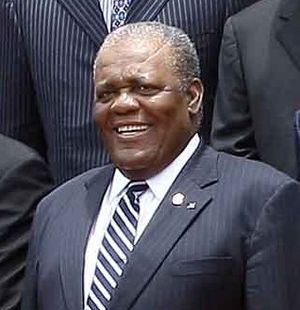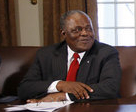Hubert Ingraham facts for kids
Quick facts for kids
Hubert Ingraham
PC |
|
|---|---|

Ingraham in 2009
|
|
| 2nd Prime Minister of the Bahamas | |
| In office 4 May 2007 – 8 May 2012 |
|
| Monarch | Elizabeth II |
| Governor-General | A.D. Hanna Sir Arthur Foulkes |
| Deputy | Brent Symonette |
| Preceded by | Perry Christie |
| Succeeded by | Perry Christie |
| In office 21 August 1992 – 3 May 2002 |
|
| Monarch | Elizabeth II |
| Governor-General | Sir Clifford Darling Sir Orville Turnquest Dame Ivy Dumont |
| Preceded by | Sir Lynden Pindling |
| Succeeded by | Perry Christie |
| Minister of Finance of the Bahamas | |
| In office 4 May 2007 – 8 May 2012 |
|
| Preceded by | Perry Christie |
| Succeeded by | Perry Christie |
| In office 1992–1995 |
|
| Preceded by | Paul Adderley |
| Succeeded by | William Clifford Allen |
| Personal details | |
| Born |
Hubert Alexander Ingraham
4 August 1947 Pine Ridge, Bahamas |
| Political party | Progressive Liberal Party (1970s–1987) Independent (1987–1990) Free National Movement (1990–present) |
| Spouse | Delores Miller |
Hubert Alexander Ingraham, born on August 4, 1947, is a Bahamian politician. He served as the Prime Minister of the Bahamas two times. His first time was from August 1992 to May 2002. He served again from May 2007 to May 2012.
Ingraham is a member of the Free National Movement (FNM) Party. Before the 2012 election, he was the leader of the FNM party. He was also a Member of Parliament for the North Abaco area. He was the leader of the opposition in the Bahamian Parliament from 2005 to 2007.
In the important election of August 1992, the FNM party won. They defeated the Progressive Liberal Party (PLP). Ingraham became Prime Minister after Lynden Pindling, who had led the PLP government for 25 years. After his party won the May 2007 election, he became Prime Minister again.
After his government lost the 2012 general election, Ingraham announced his resignation. On May 7, 2012, he stepped down as FNM leader and as a Member of Parliament.
Contents
Early Life and Career Beginnings
Ingraham was born on August 4, 1947, in Pine Ridge, Grand Bahama. His father, Jerome Ingraham, worked as a stevedore (someone who loads and unloads ships). His mother was Isabella La-Roda. He grew up in Coopers Town, Abaco.
He started his education at Coopers Town Public School. Later, he attended Southern Senior School and the Government High School Evening Institute in Nassau.
Studying Law and Entering Politics
Ingraham studied law in Nassau. He became a lawyer in the Bahamas in December 1972. He later became a senior partner in the law firm of Christie, Ingraham and Co.
He began his political career in 1975. He was elected to the National General Council of the Progressive Liberal Party (PLP), which was the ruling party at the time. Before this, he worked for the Air Transport Licensing Authority. He also chaired the Real Property Tax Tribunal.
Ingraham worked in accounting for a short time. He was at Owens-Illinois Sugar Mill Company in Abaco. He also worked at The Bahamas Telecommunications Corporation and Chase Manhattan Bank in Nassau. After that, he became a law clerk at McKinney Bancroft and Hughes.
Becoming a Cabinet Minister
In 1976, Ingraham was elected National Chairman of the Progressive Liberal Party (PLP). He also became a member of the party's National Executive Committee. In 1977, while still Chairman of the PLP, he was elected to the House of Assembly.
In Parliament, Ingraham served on important committees. He was a member of the Standing Committee on Privilege and Public Accounts. He also chaired a special committee that looked into influence peddling and political donations.
He was re-elected to Parliament in June 1982. He was then appointed Minister of Housing and National Insurance from 1982 to 1984. In 1982, he also became Chairman of The Bahamas Mortgage Corporation. This organization helped Bahamians get housing loans.
Time in Opposition
In the 1987 general election, Ingraham ran as an independent candidate. He was one of only two Members of Parliament who had been expelled from the ruling PLP but were immediately re-elected as independents.
Ingraham joined the Official Opposition in April 1990. He was quickly appointed as their Parliamentary Leader. When the Leader of the Opposition, Sir Cecil Wallace-Whitfield, passed away in May 1990, Ingraham was chosen. He was unanimously elected Leader of the Free National Movement (FNM). On May 18, 1990, Sir Henry Milton Taylor, the Governor-General, appointed him leader of the opposition.
In June 1990, as the new FNM Leader, he led his party to a victory. They won a by-election in Marco City, Grand Bahama, against the ruling party. In the general election of August 19, 1992, Ingraham led the FNM to a big win. They defeated the Progressive Liberal Party 32–17. This ended the 25-year rule of Prime Minister Sir Lynden Pindling.
First Term as Prime Minister

As the new Prime Minister, Ingraham was also in charge of the Ministry of Finance from 1992 to 1995. Later, he also took on responsibility for trade and industry. He quickly set up a special Investment Authority. This authority helped bring new investments to The Bahamas.
In July 1993, Prime Minister Ingraham became a Privy Counsellor. This made him a member of Her Majesty's Most Honourable Privy Council. On March 14, 1997, Ingraham led the FNM to an even bigger election victory.
Ingraham had promised that he would serve no more than two terms, or 10 years, as Prime Minister. In 2001, the FNM held special elections for new party leaders. Tommy Turnquest was chosen to take over as leader of the FNM after the next general elections.
Key Achievements as Prime Minister
Ingraham is recognized for allowing the Atlantis Paradise Island project to grow. This project helped boost tourism in the Bahamas.
His government also managed changes at the Bahamas Telecommunications Company in the mid-1990s. Many employees left the company, but they received special payments.
During his first term, he guided the Bahamas through changes in its financial services. New rules were put in place by international groups like the OECD and the FATF. These changes were seen as necessary by his government. However, some people debated how quickly these changes were made.
By the end of his first term, the Bahamian economy was facing a slowdown. This was due to a global economic downturn. It was also affected by new banking rules set by his government.
Another important issue during his time was a referendum on social policy in 2002. Some people believe that the failure of this referendum led to the FNM's big loss in the 2002 election. The Progressive Liberal Party won by a large margin of 29–7.
Back in Opposition
In 2001, Ingraham announced he would step down as party leader. Tommy Turnquest, who was in his Cabinet, became the party's new leader. However, in the 2002 General Election, the FNM party lost badly. Both Turnquest and his deputy lost their seats in Parliament.
Even though Ingraham kept his North Abaco seat, he did not immediately return to party leadership. He was not the Leader of the Opposition or in charge of house business right away. It was not until the party's convention in November 2005 that he was again elected FNM Leader. Some people criticized this, saying it went against his earlier promise to only serve two terms as Prime Minister. However, he was chosen to lead the party again before the 2007 general elections.
At that time, Ingraham said it was about trust. He believed the country needed reform because people had lost trust in the government. He stated that the FNM had a plan to bring back people's trust in government.
He said that leadership by the Free National Movement would focus on the interests of Bahamians. He promised to remove improper influence from government. He also aimed to bring back honesty to public life. He wanted to restart efforts for efficient and effective government.
Second Term as Prime Minister
In the general election held on May 2, 2007, the FNM won most of the seats. They defeated the PLP. Ingraham was sworn in as Prime Minister on May 4. He also became the Minister of Finance in the new government.
His government lost the May 2012 general election. As a result, Ingraham announced he would resign as FNM leader and as a Member of Parliament. His resignation took effect on May 26, 2012. On May 9, 2012, Hubert Minnis was chosen by FNM members to become the new Leader of the Opposition.
See also
 In Spanish: Hubert Ingraham para niños
In Spanish: Hubert Ingraham para niños
 | DeHart Hubbard |
 | Wilma Rudolph |
 | Jesse Owens |
 | Jackie Joyner-Kersee |
 | Major Taylor |

